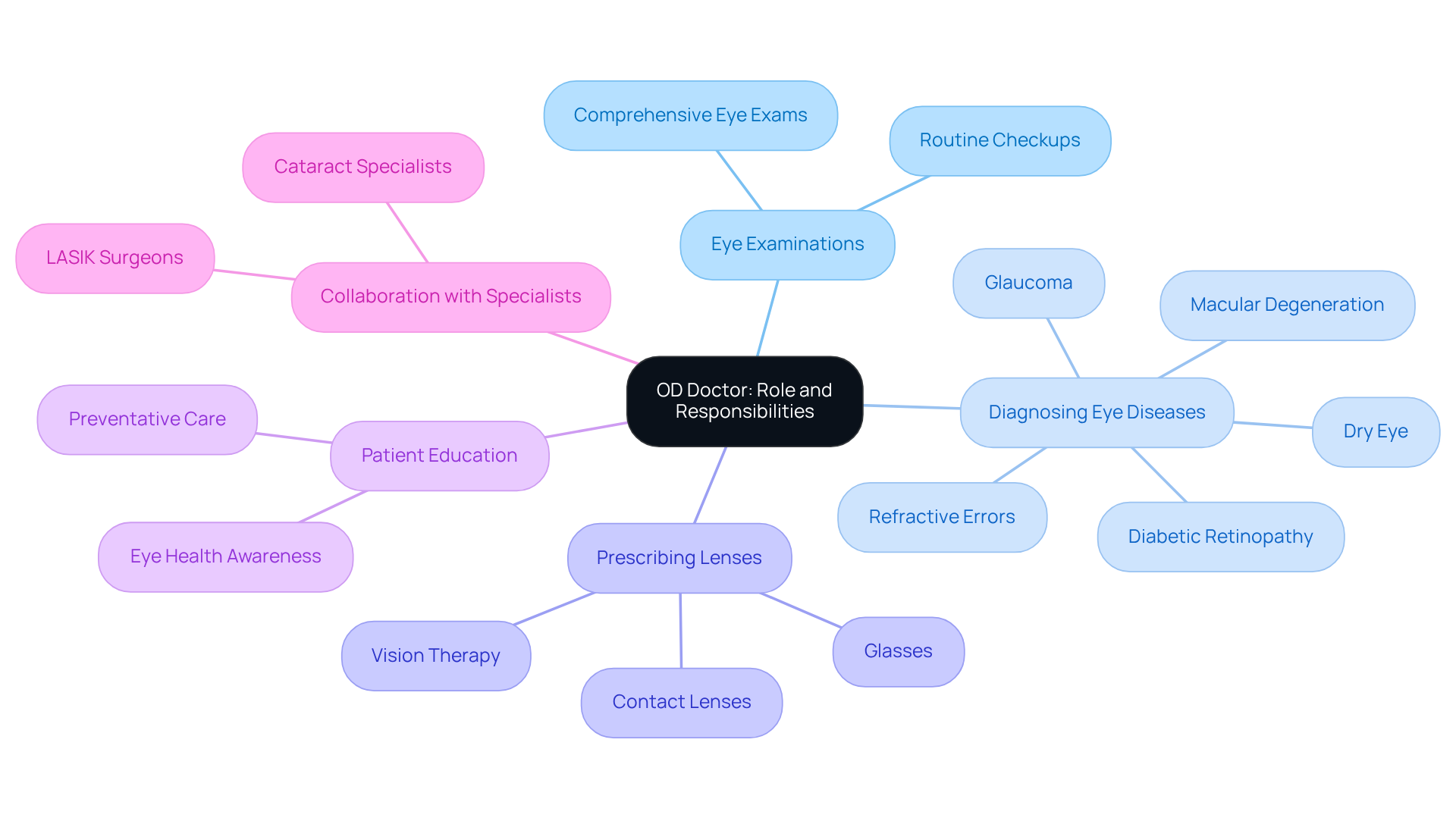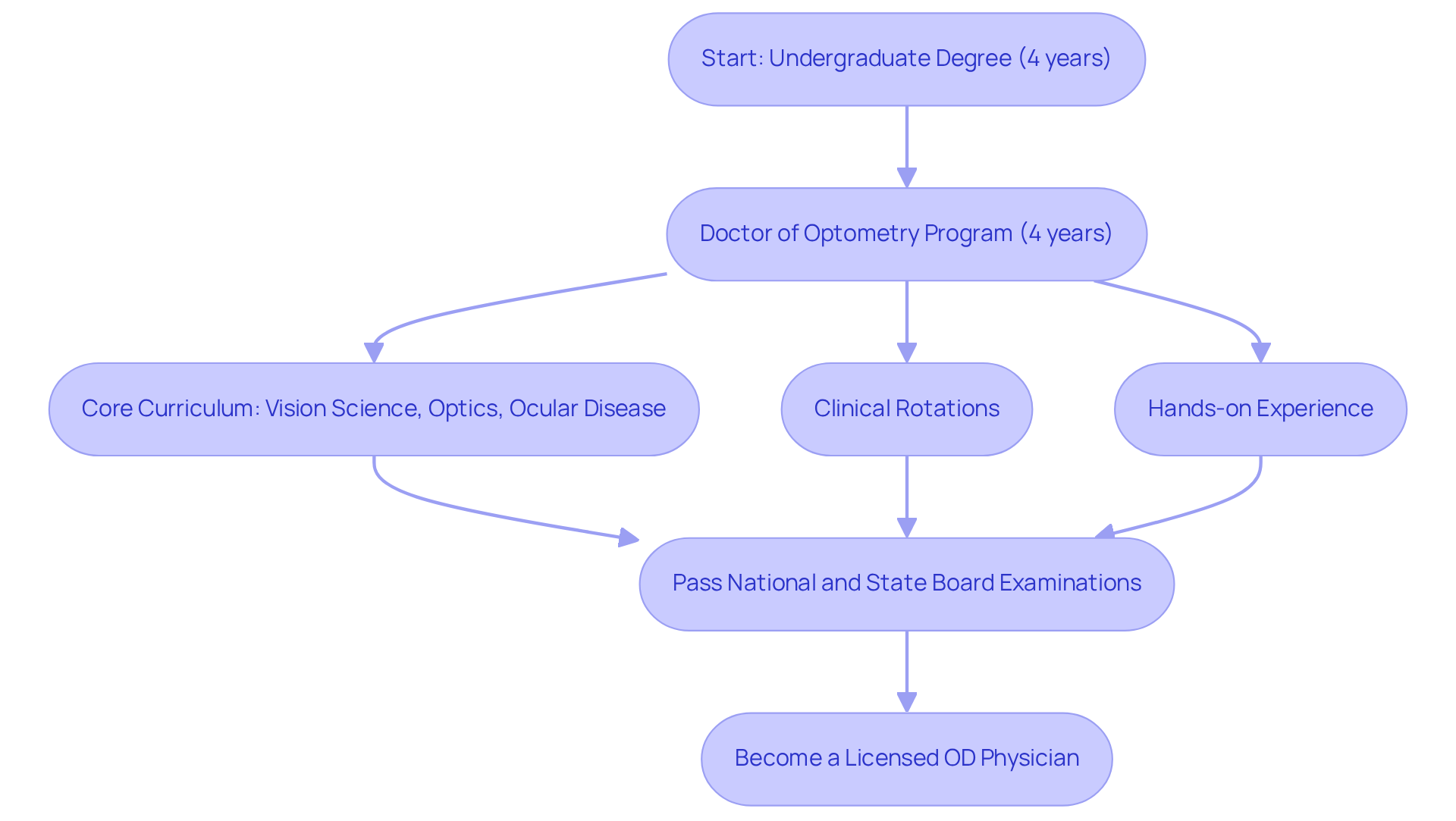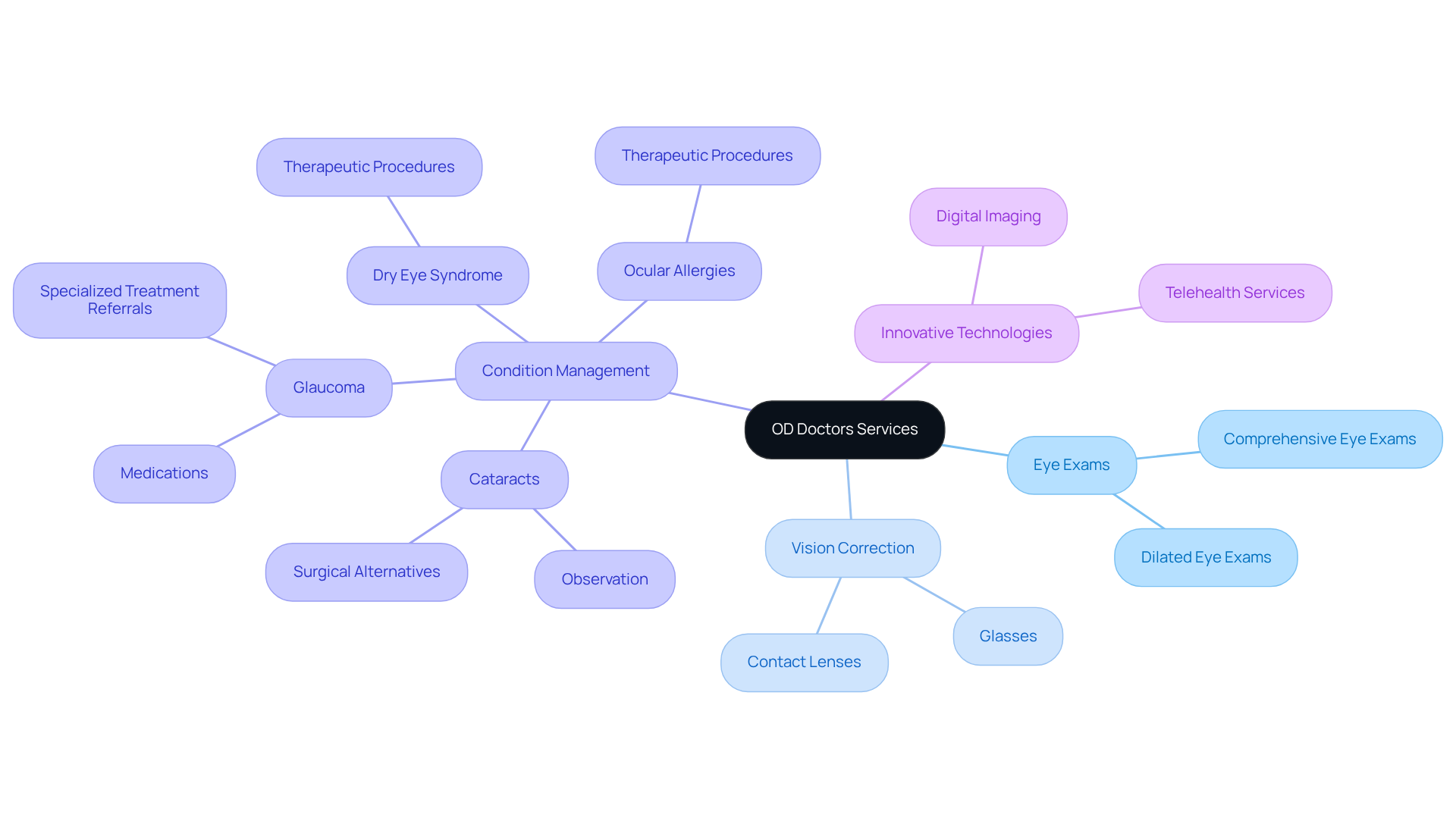Posted by: Northwest Eye in General on September 5, 2025
Overview
OD doctors, or Doctors of Optometry, are vital to your eye care journey. They conduct comprehensive eye examinations, diagnose and manage eye diseases, and prescribe corrective lenses. We understand that your vision health is important, and OD doctors serve as your primary eye care providers. They address common vision issues and help identify systemic diseases through thorough examinations. This significant contribution to public eye health is something we value deeply.
It’s common to feel uncertain about your eye health, but rest assured, OD doctors are here to support you. Their expertise not only helps in managing your vision but also plays a crucial role in your overall well-being. By choosing to see an OD doctor, you are taking an important step towards ensuring your eyes and health are in good hands.
Introduction
The world of eye care can often feel overwhelming, particularly when trying to grasp the roles of various professionals dedicated to maintaining vision health. Among these specialists, OD doctors—Doctors of Optometry—are vital guardians of ocular well-being. They provide a wide array of services, ranging from routine eye exams to the management of complex conditions. As the first line of defense against vision-related issues, these experts not only diagnose and treat but also take the time to educate patients on the importance of proactive eye care.
We understand that navigating these choices can be daunting, so it’s natural to wonder what truly sets OD doctors apart from their medical counterparts and how they expertly navigate the intricate landscape of eye health.
Define OD Doctor: Role and Responsibilities in Eye Care
An OD doctor, or Doctor of Optometry, is a healthcare expert dedicated to your eye and sight health. We understand that concerns about vision can be daunting, and our primary responsibilities include:
- Conducting comprehensive eye examinations
- Diagnosing and managing eye diseases
- Prescribing corrective lenses
At Northwest Eye, our OD specialists play an essential role in delivering patient-focused solutions, ensuring that you receive prompt and suitable assistance for a variety of conditions, including glaucoma and dry eye.
It’s common to feel uncertain when faced with eye health issues. In contrast to ophthalmologists, who are medical professionals specializing in surgical techniques, OD doctors emphasize primary eye services. This includes everything from vision assessments to the management of typical eye issues. We are here to be your first line of defense in eye health, working alongside specialists in cataracts, LASIK, and other advanced treatments available at Northwest Eye. Together, we enhance the overall quality of eye care for our patients, reassuring you that you are in compassionate hands.

Contextualize the Importance of OD Doctors in Eye Health
OD doctors play a crucial role in safeguarding public eye health, often serving as the first line of defense in identifying systemic diseases that present with ocular symptoms such as diabetes and hypertension. We understand that concerns about eye health can be overwhelming, but know that their thorough eye examinations can reveal early signs of conditions such as diabetic retinopathy, blurred sight, dry eyes, and uncorrected refractive error. Identifying these issues early can significantly reduce the risk of sight loss. Research shows that over 90% of diabetes-related vision loss can be prevented with timely detection and treatment.
Moreover, OD doctors play a crucial role in educating patients about eye health. They highlight preventive measures and the importance of regular eye check-ups. This proactive approach is vital, especially for those in underserved communities where access to specialized eye care may be limited. By fostering awareness and encouraging regular checkups, OD professionals contribute to better health outcomes, empowering patients to take charge of their eye health.
If you’re experiencing any symptoms, including blurred sight, we encourage you to arrange a meeting with a Northwest Eye specialist for a thorough assessment. Remember, you are not alone in this journey; we are here to help you through the process.
Outline Educational Pathways and Training for OD Doctors
To become an OD physician, individuals embark on a journey that begins with a four-year undergraduate degree, followed by a four-year Doctor of Optometry program accredited by the Accreditation Council on Optometric Education (ACOE). This curriculum covers a broad spectrum of subjects, including vision science, optics, and ocular disease, all while providing extensive clinical training. Students engage in clinical rotations, gaining invaluable hands-on experience in diagnosing and treating patients under the mentorship of licensed optometrists. This practical exposure is essential, as it prepares them for the real-world scenarios they will encounter in their practice.
Upon graduation, candidates face the important step of passing both national and state board examinations to obtain licensure. This rigorous training pathway ensures that OD professionals are not only knowledgeable but also skilled at delivering high-quality eye care services. Present data indicates that there are numerous accredited optometry programs nationwide, reflecting the growing demand for qualified eye health professionals. For example, the average overall GPA for the 2025 entering class in optometry programs is 3.48, highlighting the competitive nature of admissions and the caliber of students entering the field. Additionally, the average science GPA for the 2025 class stands at 3.32, further underscoring the academic standards expected of incoming students.
Moreover, clinical training for optometry students is thoughtfully designed to meet the evolving needs of the healthcare landscape, ensuring that graduates are well-prepared to tackle a variety of eye health challenges. Notably, the graduation rate for Pacific University in 2023 was 84.38%, serving as a benchmark for the quality of optometry education. The pass rate for the OEBC Written Component was an impressive 100% in 2021-22, showcasing the success of graduates in licensure examinations and reinforcing the effectiveness of their training. This comprehensive educational framework highlights the vital role of OD doctors in delivering essential eye care services.

Detail Services and Treatments Offered by OD Doctors
OD doctors provide a diverse range of services that are essential for maintaining your eye health. We understand how important it is to feel confident in your vision. They conduct comprehensive eye exams, provide vision correction through glasses and contact lenses, and diagnose and manage various eye conditions, including cataracts and glaucoma.
For cataracts, optometrists may suggest surgical alternatives or simply observe the condition, while glaucoma management frequently includes prescribing medications or referring you for specialized treatment. Additionally, OD professionals are trained to perform therapeutic procedures for conditions like dry eye syndrome and ocular allergies.
By integrating advanced technologies, many OD practitioners now employ telehealth services and digital imaging to enhance patient assistance and accessibility. This trend reflects a broader movement within the eye health sector, where innovative solutions are becoming more common.
With the global vision care market exceeding $70 billion, the importance of OD doctors is more vital than ever. They provide both routine and specialized care, ensuring that you receive comprehensive support throughout your eye health journey with an OD doctor. Remember, we are here to help you through this process.

Conclusion
An OD doctor, or Doctor of Optometry, plays a crucial role in your healthcare journey, dedicated to ensuring your eye and vision health. They conduct thorough eye examinations, diagnose conditions, and prescribe corrective lenses. This focus on primary eye care sets OD doctors apart from ophthalmologists, allowing them to be your first point of contact for any vision concerns you may have.
The importance of OD doctors goes beyond individual care; they are key in identifying systemic diseases and educating the public about eye health. By detecting conditions like diabetic retinopathy early and providing proactive education, OD professionals significantly contribute to preventing vision loss and promoting better health outcomes, especially in underserved communities. Their rigorous training and commitment to quality eye care equip them to effectively address various ocular issues.
With the increasing demand for eye care services, the role of OD doctors is more vital than ever. They foster awareness about the importance of regular eye check-ups and utilize innovative technologies, empowering you to take charge of your eye health. Engaging with an OD doctor not only enhances your personal vision care but also supports broader community health initiatives, highlighting the significance of these professionals in the healthcare landscape.
We understand that taking care of your eyes is essential, and we are here to help you through this process. Regular visits to an OD doctor can make a difference in your overall health and well-being, ensuring that you receive the compassionate care you deserve.
Frequently Asked Questions
What is an OD doctor?
An OD doctor, or Doctor of Optometry, is a healthcare expert focused on eye and sight health, responsible for conducting eye examinations, diagnosing and managing eye diseases, and prescribing corrective lenses.
What are the primary responsibilities of an OD doctor?
The primary responsibilities of an OD doctor include conducting comprehensive eye examinations, diagnosing and managing eye diseases, and prescribing corrective lenses.
How do OD doctors differ from ophthalmologists?
OD doctors emphasize primary eye services and focus on vision assessments and the management of common eye issues, while ophthalmologists are medical professionals who specialize in surgical techniques.
What types of conditions do OD doctors manage?
OD doctors manage a variety of conditions, including glaucoma and dry eye, and serve as the first line of defense in eye health.
How do OD doctors collaborate with other eye care specialists?
OD doctors work alongside specialists in areas such as cataracts and LASIK to enhance the overall quality of eye care for patients at Northwest Eye.






